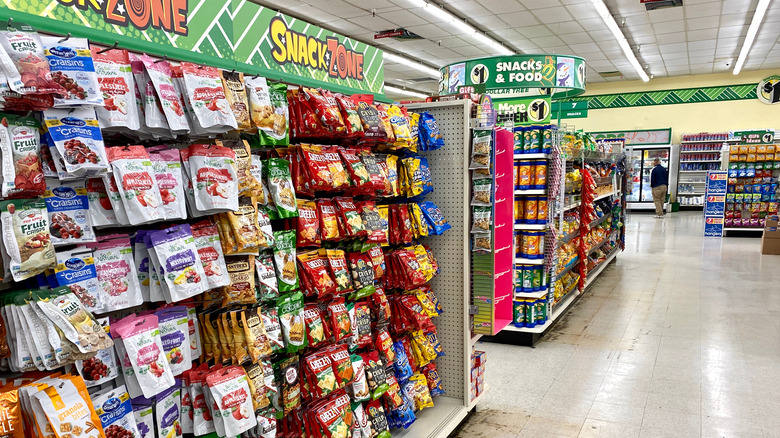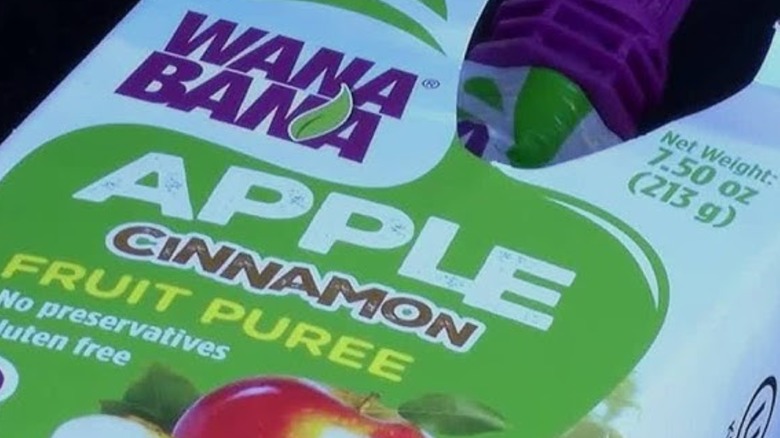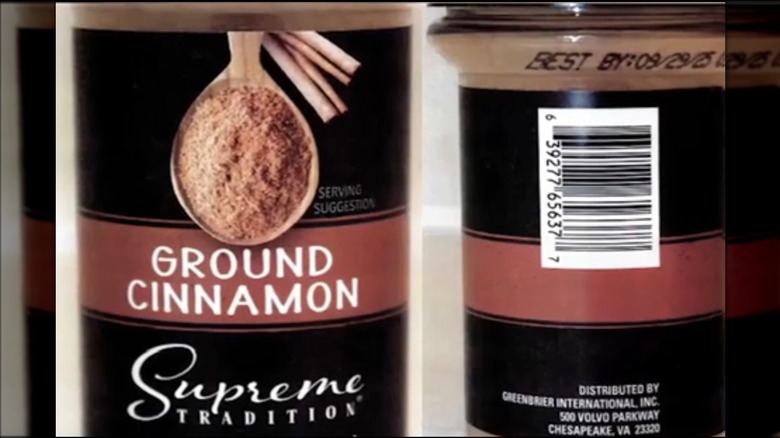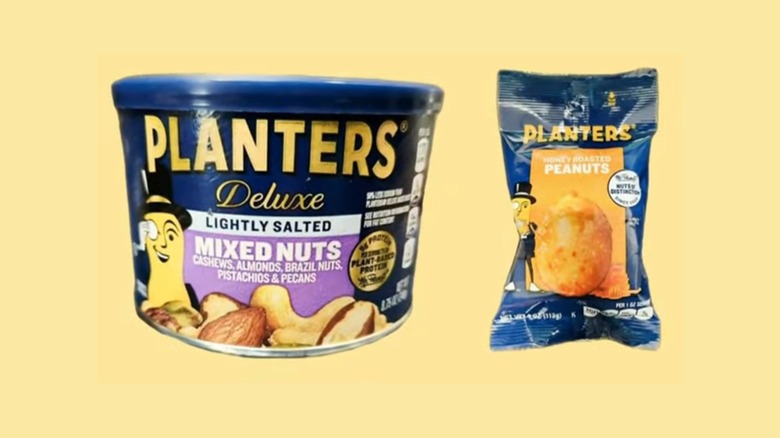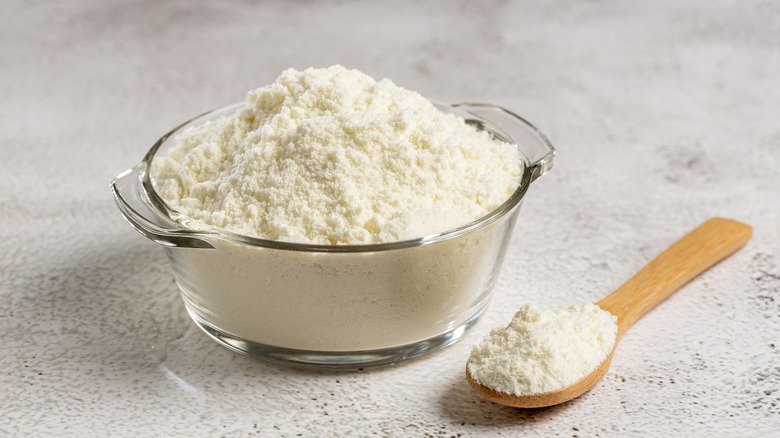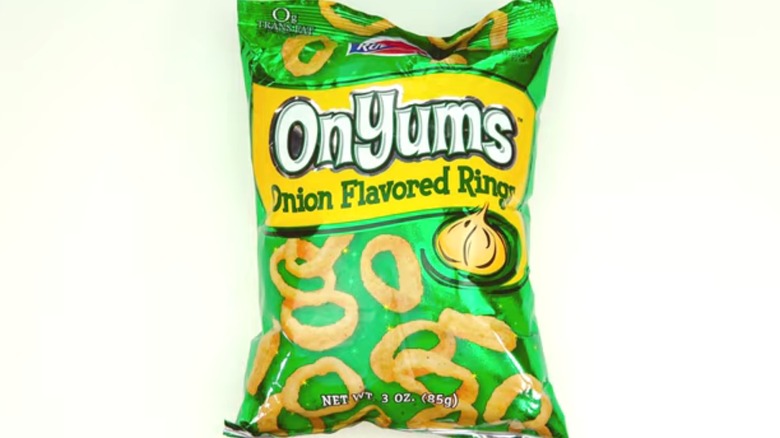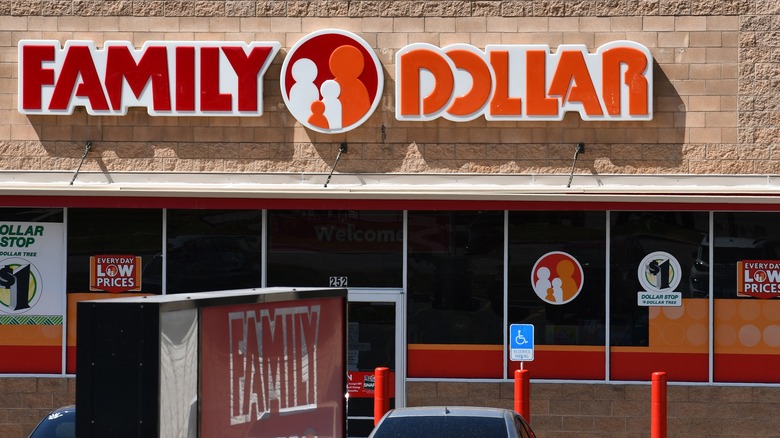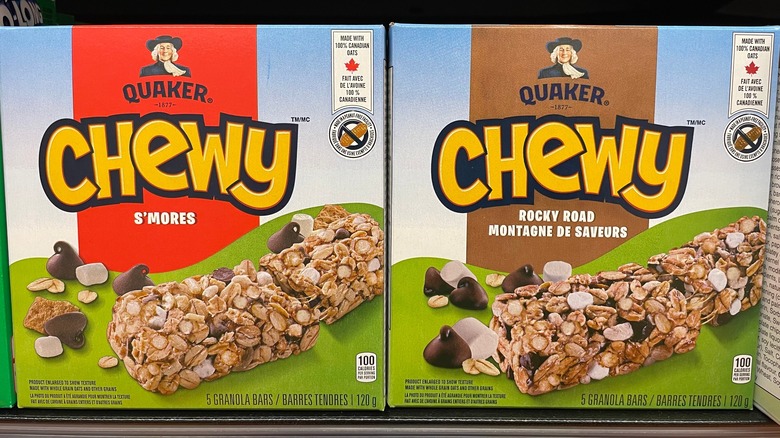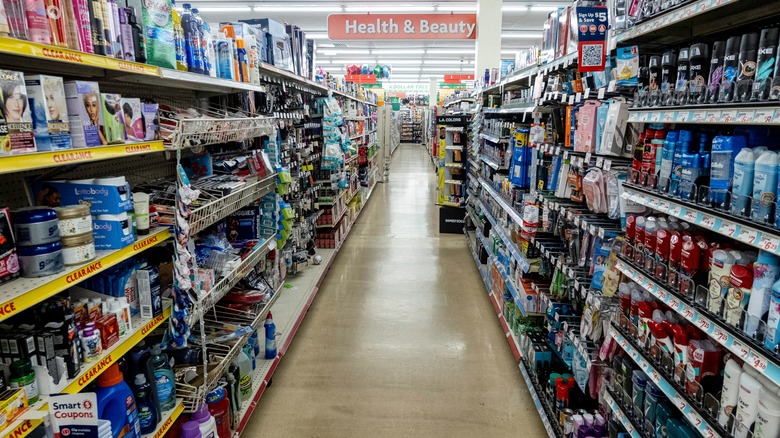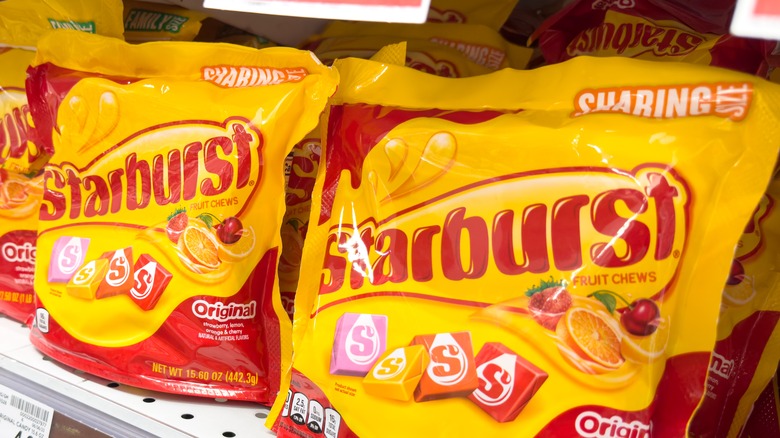The Biggest Food Recalls In Dollar Tree's History
Just about every store has to deal with recalls, even seemingly straightforward dollar stores like Dollar Tree. And while it's more often that manufacturers, not the store, are the ones responsible for the problem leading to a recall, sometimes the store's reaction can leave much to be desired.
Ultimately, recalls are supposed to keep consumers safe. For many, they're not always a sign that something bad has happened, and many recalls are issued just because the manufacturer wants to be sure that the product won't lead to even minor injury or illness. But other times, it's the consumers who report problems that force companies to remove products as quickly as possible. There are also instances when the company's own facilities are the source of the contamination or poor conditions that lead to a recall; that particular situation has affected one of Dollar Tree's subsidiary companies, Family Dollar.
Regardless of the reason for the recall, though, the store has a responsibility to pull the product as soon as it can and ensure that no one is able to buy it. Thankfully, Dollar Tree's stores and employees have typically complied with all recall requests and swiftly taken affected products off the shelves (with one major exception that unfortunately resulted in a warning letter from the FDA and a class-action lawsuit). If you want more information about the times Dollar Tree and Family Dollar have had to rush to remove products, take a look at the biggest food recalls in Dollar Tree's history.
WanaBana Apple Cinnamon Fruit Puree pouches
Possibly one of the most severe food recalls that Dollar Tree has had to deal with is the WanaBana applesauce recall (this affected other stores, such as its entry in the list of the biggest Sam's Club recalls). In October 2023, WanaBana USA issued a recall for its apple cinnamon fruit puree pouches. Cinnamon applesauce used in the pouches was found to contain almost 200 times the amount of lead that the FDA had been considering for a limit in baby food. (The FDA's limit is still draft guidance as of 2024, but the applesauce contained so much lead that the recall was still urgent.) The apple puree was also sold under two other brands, Schnucks and Weiss. Even worse, the FDA found that the puree also contained high levels of chromium, indicating that the company may have used lead chromate in the product.
In June 2024, the FDA sent a warning letter to Dollar Tree stating that the department had conducted checks of stores to ensure the company was complying with the recall. It had found that numerous stores had not removed the product even eight weeks after the recall had been announced. According to the FDA, Dollar Tree representatives claimed they had already removed the products. Yet the FDA maintained that the tainted products had remained on Dollar Tree's shelves through at least mid-December 2023, and it also said that at least 50 children had been affected.
Supreme Tradition Ground Cinnamon
Again with the lead-tainted food: Another huge recall of a Dollar Tree product involved lead in ground cinnamon, and it might not have been discovered had it not been for the WanaBana recall. After the cinnamon applesauce recall, the FDA started looking at other cinnamon products to find out if any of them had extra lead, too. Sure enough, some did. This round, it included brands of ground cinnamon made by Colonna Brothers. The cinnamon was sold at different stores under a variety of names, including Supreme Tradition Ground Cinnamon at Dollar Tree and Family Dollar. At least seven different lot codes were affected by the recall, and although the amount of lead present in the tested samples was much less than what was found in the WanaBana applesauce, it still exceeded safe levels and meant that a recall was necessary.
Despite the fact that this and the WanaBana recall both involved lead-tainted cinnamon, it's not yet known if the cinnamon in both products came from the same source. In May 2024, both Dollar Tree and Colonna Brothers became the targets of a class action lawsuit based on the cinnamon recall. In the suit, the plaintiff claimed both companies should have been able to test and ensure the products they sold were safe for human consumption. At the time, Dollar Tree was already facing a lawsuit regarding the cinnamon applesauce recall from parents who say their children suffered lead poisoning from the product.
Olam Tomato Processors Mild Chunky Salsa
Here's one that might just make you worry about what you're biting into when you eat salsa from a glass jar (though, honestly, you're more than likely just fine). Back in 2013, Olam Tomato Processors issued a recall of its Mild Chunky Salsa product because of glass shards that had been detected in some samples. Dollar Tree wasn't the only retail company affected, but it was one of the more well-known and was usually listed by name in headlines concerning the recall. Both mild and medium chunky salsa varieties were pulled after three people complained that they had found glass in their salsa, which the company said may have gotten into the product when jars were damaged during processing.
Luckily, the people involved weren't hurt, as they had found the glass before eating any of the salsa. What's more, apparently the pieces of glass were large enough to see easily. But it's definitely a lesson in always checking any food you buy; for example, in 2022, a Redditor reported finding a large shard of glass in salsa bought at Trader Joe's. An article in Food Manufacturing in 2013 reported that people had found glass in TV dinners and bread dough. Manufacturers do frequently use equipment that's supposed to detect contaminants and defects in glass food jars, but on rare occasions, those defects and damaged parts can still get through. So, consumers may wish to take a little extra caution and inspect food before eating.
Planters Honey Roasted Peanuts and Deluxe Lightly Salted Mixed Nuts
Dollar Tree hasn't had the best luck regarding recalls in 2024, given that yet another one hit the company in May. That year, Hormel Foods announced that Planters Honey Roasted Peanuts and Deluxe Lightly Salted Mixed Nuts may have been contaminated with Listeria monocytogenes. You normally hear about listeria in relation to contaminated lunch meat or raw milk, but the truth is that bacteria can contaminate more than just animal or perishable products. No information was available as of this writing about how the products might have become compromised, only that Hormel discovered that the products might have been contaminated after they were sent out to warehouses.
Luckily, this was a small recall that affected only two companies, Dollar Tree and Publix. Moreover, the recall only affected limited lots of the products. No one reported any ill effects, either. But because listeria can be so serious, Hormel decided to recall the products to be on the safe side.
If you're a relatively healthy adult, you may have some short-term effects if you become infected with this bacteria, including symptoms like nausea, diarrhea, and severe headaches. But the real problem is when pregnant people, children, older people, and those with compromised immune systems become infected. Listeria can cause miscarriages and even stillbirths (this is the reason pregnant people are often warned to avoid processed lunch meat), and it can be fatal for people in those other groups.
Double Takes Macaroni and Cheese
Companies that make products with multiple ingredients tend to get those ingredients from different manufacturers, and depending on what's in those deliveries, there could be even more manufacturers involved further up the chain. Macaroni and cheese cups, for example, may have macaroni from one company and cheese powder from another, and the components that make up those two ingredients (flour and eggs, milk powder and cheese flavoring, and so on) are likely from a variety of unique sources. A problem anywhere in that chain can result in recalls that ripple outward, affecting many products and companies that might otherwise seem unrelated. That's what happened in late 2016, when the Double Takes brand of macaroni and cheese cups, some of which were sold at Dollar Tree, were recalled.
Double Takes was produced by Fourth Street Barbecue, which issued a recall in late 2016 because the milk powder used in the cheese packets was itself part of a recall. The FDA had inspected the facilities of Valley Milk Products, the company that produced the milk powder, and found both poor sanitation practices and salmonella contamination.
Yet, Valley Milk Products refused to initiate a recall at the FDA's suggestion, which led the FDA to seize the milk powder and force a recall anyway. A U.S. District Court judge later issued a permanent injunction that ordered Valley Milk Products to halt production of the milk powder until it had corrected the situation under FDA supervision.
Rudolph's OnYums Onion-Flavored Rings
A lot of recalls are issued due to allergens that are detected in food but weren't declared on the packaging. Sometimes this happens when the allergen is an ingredient but was omitted on the label. Other times, it's due to contamination by an ingredient that shouldn't have been in the product in the first place. That's what happened with Rudolph's OnYums Onion-Flavored Rings, which the company recalled in 2023 because someone had found a chip that contained wheat in a bag of the onion-flavored rings which normally didn't contain such a product. The errant chip also contained other ingredients like dyes that weren't supposed to be there, either.
This slip-up indicated that the production line for one product was contaminated with another. It sounds like a small thing that should be a simple whoops, kind of like ordering onion rings at a restaurant and finding a bonus fry at the bottom of the container. But for people with wheat allergies or gluten-sensitive conditions such as celiac disease, the presence of even one wheat-infused chip can mean the rest of the food in the container is contaminated. That then means having a reaction and possibly having to seek medical attention. It's currently unclear whether or not the errant chip was just one that ended up in another part of the facility by mistake, or if there was widespread contamination along the whole line.
Family Dollar warehouse rodent contamination hit multiple products
The Dollar Tree family of stores currently includes the Family Dollar chain. That line of stores has had its share of warehouse problems that have led to some frankly astounding recalls. Possibly the worst, which led to closures of hundreds of stores (and a complete recall of all products), occurred in 2022 when an FDA inspection of the company's distribution center in West Memphis, Arkansas revealed that the facility had a major rodent infestation. It wasn't just that rodents were in the facility; they were there in huge numbers, alive and dead. Droppings were present, packaging had signs of gnawing, and products generally weren't protected from the rodents. What also makes this recall stand out is that it was Family Dollar and Dollar Tree's responsibility, rather than the fault of an outside distributor or manufacturer.
Complaints about the distribution center actually began as early as 2020. Family Dollar's own records indicated that in the span of just seven months, it had collected 2,300 dead rodents at the distribution center, which the FDA said indicated a history of rodent problems. This wasn't just a one-off infestation where the warehouse was suddenly overwhelmed. It was a long-term situation that created a serious safety hazard.
After the discovery, exterminators fumigated the warehouse and killed another 1,200 rodents. In 2024, the Department of Justice fined Family Dollar to the tune of $41.675 million, then the largest criminal penalty issued regarding food safety in the U.S.
Quaker Oats Granola Bars and Granola Cereal
Family Dollar was once again involved in a recall in December 2023, although this time it was due to a manufacturer pulling specific products and not an issue with the store itself. Quaker Oats recalled some types of granola bars and cereals due to salmonella contamination, affecting more than just Family Dollar. In January 2024, the recall was expanded to include several more products, although the company's basic oat and oat flour products remained unaffected. Quaker reimbursed for items that customers had already bought, and there were no confirmed reports of illness.
Normally you don't hear much about recalls once contaminated products are off the shelves and the manufacturer cleans up whatever caused the problem. In Quaker Oats' case, that wasn't the end of the story. In July 2024, news broke that the FDA had sent the company a warning letter in June about conditions that inspectors had found at a Danville, Illinois, manufacturing facility.
The FDA inspected the facility after the first recall notice was issued in 2023, and it found that the products at the facility were made in unsanitary conditions. Quaker closed the facility in June 2024. Among the violations were food debris stuck in a crack in the floor and salmonella contamination of equipment and rooms. The FDA found the company had discovered salmonella there over a year before the recall, and while it had taken corrective action, what the company did clearly wasn't enough to stop the contamination.
Family Dollar warehouse had storage temperature issues
Dollar Tree may want to take a closer look at Family Dollar's warehouses because they were once again the focus of a massive recall in October 2023. This time, the recall involved mainly medications and medical devices, but the list included so many vitamins and products in gummy or liquid form that it's worth mentioning. Hundreds of products were subject to the recall because they had been stored in incorrect temperatures, which can affect the safety, quality, and effectiveness of items. The company had no evidence that anyone had gotten sick or suffered ill effects from the incorrect storage, but it wanted to be cautious because there was no telling how those products might have changed as a result.
This wasn't the first time that Family Dollar had to pull products due to incorrect storage temperatures. In May 2023, the company recalled seven Advil products from its stores because those were stored in temperatures that were outside the required range listed on the products' labels.
And in July and August 2022, the company had to issue two recalls of over-the-counter medications that were also stored outside required temperature ranges. Medications can often survive short periods of time outside the label's required temperature ranges, such as during shipping or when you carry the medication from the store pharmacy to your car. But longer-term storage needs to be within the medications' temperature range because the active ingredients can become unstable or lose potency too easily.
Skittles, Starburst, and Life Savers
The U.S. division of the Mars Wrigley Confectionery Company issued a rather alarming recall in May 2022, claiming that products like Skittles, Starburst, and Life Savers Gummies may have contained thin strips of metal either in the bag or, more worryingly, in the candy itself. The products were sold at many stores across North America, including Family Dollar. The recall was apparently issued so quickly that Consumer Reports warned consumers that the affected lot numbers might still be on shelves at their local stores, and that they subsequently needed to be careful when buying the candies. Consumers originally reported the problem to the company, so the risk that more candy had been affected was very real. Thirteen different products were potentially contaminated, but the recall has since been completed.
The products in question were made by a currently unidentified third party, rather than in a facility owned and directly operated by Mars Wrigley. This isn't an unusual move for manufacturers, as outsourcing the actual manufacturing process of a product can save money. Unfortunately, that adds another link in the manufacturing chain where something could go wrong and make the product potentially unsafe to eat.
